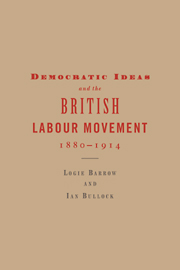Appendix: Federation for local Labour historians – and for national
Published online by Cambridge University Press: 09 November 2009
Summary
One of the aims of the trade union side of this book is to send those historians with knowledge of specific industries and unions and local labour movements during the 1890s and 1900s, back to their sources. For, in the writing of it, uneven survival of documents along with complexity of data, rules out selecting particular areas or industries or unions as likelier fields than others. From their side, local historians have omitted at least as much as national (whom we have just sampled).
It is at the branch level that support for the Clarion scheme or for anything else may conceivably bear occasional long-term significance for later developments in at least local labour movements. Regional variations may also be significant here, though sometimes less so than branch ones. Unfortunately, the preservation of branch and local union records has been notoriously uneven, despite massive advances during the last decade. But occasional indications may be culled, though all too often indirectly. Many have already been mentioned during the course of this book. The following paragraphs amount merely to an opportune scraping of the files for the benefit, if any at all, of local specialists. Those occasions when branches from a number of areas agreed on a particular initiative have been omitted.
So, in the north-west, the Friendly Society of Ironfounders (FSI)'s district that included Salford and Wigan seems to have been particularly hot on national federation and seems mainly to have preferred the Clarion's.
- Type
- Chapter
- Information
- Democratic Ideas and the British Labour Movement, 1880–1914 , pp. 305 - 313Publisher: Cambridge University PressPrint publication year: 1996



